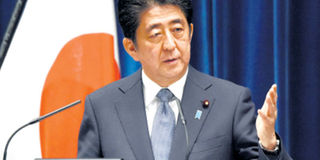Japan PM says future generations should not be blamed for atrocities

Japanese Prime Minister Shinzo Abe gestures at his official residence on August 14, 2015 as he answers questions following his war anniversary statement that neighbouring nations will scrutinise for signs of sufficient remorse over Tokyo’s past militarism. PHOTO | AFP
What you need to know:
- In a closely watched speech a day ahead of the 70th anniversary of the end of WWII, the nationalist premier appeared to tread a fine line between regret over Japanese wartime aggression while also focusing on what his pacifist country had done since the end of the conflict.
- Referring to those who perished in the war, Mr Abe expressed “profound grief and my eternal, sincere condolences”. He said this was also for millions of Japanese who died, some from the US atomic bombings.
Japanese Prime Minister Shinzo Abe expressed deep remorse over World War II and said previous national apologies were unshakeable, but emphasised future generations should not have to keep saying sorry.
In a closely watched speech a day ahead of the 70th anniversary of the end of WWII, the nationalist premier appeared to tread a fine line between regret over Japanese wartime aggression while also focusing on what his pacifist country had done since the end of the conflict.
“Japan has repeatedly expressed feelings of deep remorse and heartfelt apology for its actions during the war.... we have consistently devoted ourselves to the peace and prosperity of the region since the end of the war,” Mr Abe said.
“Such position articulated by the previous cabinets will remain unshakable into the future.”
When speaking about China, Mr Abe referred to “unbearable sufferings caused by the Japanese military” and said Tokyo took the wrong course in going to war.
Referring to those who perished in the war, Mr Abe expressed “profound grief and my eternal, sincere condolences”. He said this was also for millions of Japanese who died, some from the US atomic bombings.
Mr Abe, a grandson of a wartime cabinet minister, added that “we have engraved in our hearts” the suffering of Asian neighbours, including South Korea, Indonesia, the Philippines and Taiwan”.
But Mr Abe — who has been criticised for playing down Japan’s war record and trying to expand its present-day military — added that future generations of Japanese should not have to apologise.
“We must not let our children, grandchildren and even further generations to come, who have nothing to do with that war, be predestined to apologise,” he said.
China and South Korea had previously made clear they wanted him to stick to explicit prime ministerial apologies.
China says more than 20 million of its citizens died as a result of Japan’s invasion, occupation and atrocities, while Tokyo colonised the Korean peninsula for 35 years until 1945.
Media reaction in South Korea was negative, with TV analysts noting the general expressions of grief and remorse but no explicit apology for Japan’s aggression.
“Abe skips his own apology,” ran the headline on the national Yonhap news agency, which said the speech had fallen short of South Korea’s expectations.
Seoul said after the speech, Foreign Minister Yun Byung-Se received a call from his Japanese counterpart, Fumio Kishida, to explain the message.





